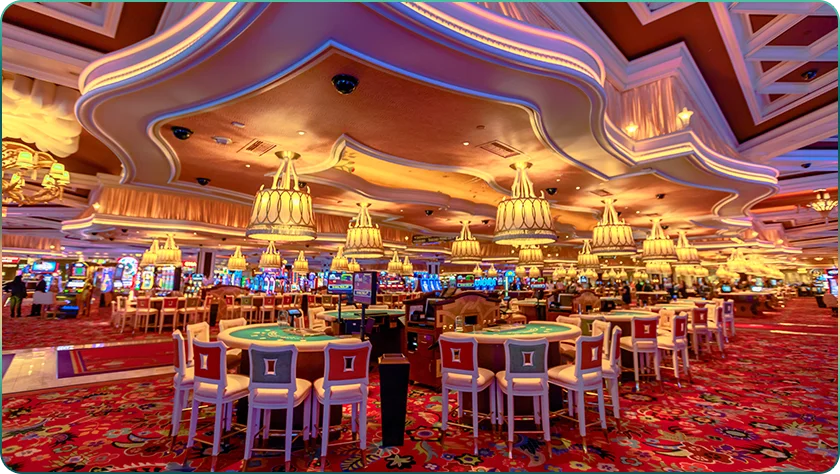How the Wealthiest Casino Tycoons Rose, Adapted, and Shaped the Industry

The gambling industry, especially the ‘brick-and-mortar’ sector of it, has long been associated with a wealth of moguls, particularly if you trace this back as far as Las Vegas in the 1950s.
Over the last few decades, this has only increased in terms of the number of individuals involved; however, as the sector has grown bigger and new markets have opened up, this has also presented its fair share of challenges.
Many of these names that existed a few decades ago are still around today, many of them being globally recognized as behemoths and even influencers who have a significant amount of sway on the industry.
Sheldon Adelson: From Humble Beginnings to Global Casino Tycoon
Adelson, the late founder of Las Vegas Sands Corporation, remains a towering figure in the casino industry. Born to a low-income family in Boston, Adelson’s entrepreneurial spirit emerged early. By the time he was in his teens, he was already dabbling in small business ventures. His big break came later in life when he founded the COMDEX trade show, a technology event that brought him substantial wealth.
In the 1980s, Sheldon Adelson shifted his focus to casinos, acquiring the Sands Hotel and Casino in Las Vegas. His vision to revolutionize the industry led to the creation of integrated resorts, combining luxurious accommodation, world-class entertainment, and expansive gaming floors. The Venetian in Las Vegas and Marina Bay Sands in Singapore stand as testaments to his ingenuity.
Adelson faced significant challenges, including regulatory hurdles and economic downturns. However, his resilience and foresight allowed him to navigate these obstacles and expand his empire globally. As a result, Adelson became one of the wealthiest casino owners in history, leaving a lasting legacy.
Steve Wynn: The Visionary Behind Las Vegas' Modern Luxury
Wynn is often credited with transforming Las Vegas into a destination for upscale entertainment and hospitality. Born in Connecticut, Wynn inherited a small bingo business from his father, which ignited his passion for gaming. In the 1970s, he acquired the Golden Nugget in Las Vegas, where he demonstrated his ability to revitalize ageing properties.
Wynn's most significant contribution came in the 1990s with the creation of The Mirage, the first luxury mega-resort on the Las Vegas Strip. Featuring a volcano, a tropical rainforest, and opulent décor, The Mirage set a new standard for casino resorts. Wynn followed this success with iconic properties such as Bellagio, Wynn Las Vegas, and Encore.
Despite his achievements, Wynn’s career has not been without controversy. Legal battles and personal scandals have occasionally overshadowed his accomplishments. However, his visionary approach to casino development, which combines luxury, art, and entertainment, has substantially influenced the global industry.
Kirk Kerkorian: The Pioneer of Mega-Resorts
Kerkorian, often referred to as the “father of the Las Vegas mega-resort,” played a pivotal role in shaping the city’s skyline. Born to Armenian immigrants in California, Kerkorian had a humble start, dropping out of school to support his family. His initial success came in aviation, where he founded Trans International Airlines, selling it for a substantial profit.
Kirk Kerkorian entered the casino industry in the 1960s, building the International Hotel, which was then the largest hotel-casino in the world. He later developed the MGM Grand, another record-breaking property, which further cemented his reputation as an industry leader.
Kerkorian’s vision was to create resorts that offered more than just gambling, incorporating entertainment, fine dining, and shopping. His contributions significantly transformed Las Vegas into a global entertainment hub. Despite enduring financial challenges during economic downturns, Kerkorian's resilience and ability to innovate ensured his lasting impact on the industry.
Lawrence Ho: Leading the Casino Boom in Asia
Ho, the CEO of Melco Resorts & Entertainment, is a key figure in the expansion of the casino industry in Asia, preceding online casinos in the Philippines. The son of Stanley Ho, the “King of Gambling” in Macau, Lawrence carved his own path by modernizing and globalizing the family business.
Under his leadership, Melco has developed some of the most luxurious casino resorts in the world, including City of Dreams in Macau and Studio City. These properties are known for their architectural grandeur, cutting-edge technology, and diverse entertainment offerings
Ho’s success is largely attributed to his ability to understand the cultural nuances of the Asian market. By focusing on non-gaming attractions, such as high-end retail and Michelin-starred dining, he has substantially broadened the appeal of his resorts. However, Ho has also faced challenges, including regulatory scrutiny and competition from other operators. His resilience and forward-thinking approach have significantly contributed to his success.
Phil Ruffin: The Self-Made Billionaire of Las Vegas
Ruffin’s story is one of resilience and determination. Born in Kansas, Ruffin began his career in the convenience store business before venturing into real estate and casinos. His first major success in the industry came with the purchase of the New Frontier Hotel and Casino in Las Vegas, which he later sold for a substantial profit.
Ruffin is perhaps best known for acquiring Treasure Island from MGM Resorts during the 2008 financial crisis. The purchase was a strategic move that showcased his ability to identify opportunities even in challenging economic times. Today, Ruffin owns multiple properties, including the Circus Circus Hotel and Casino, solidifying his presence on the Las Vegas Strip.
Ruffin’s business philosophy is rooted in pragmatism and calculated risk-taking. Despite facing financial challenges during recessions, he has consistently bounced back, demonstrating an ability to adapt to changing market conditions. As a result, Ruffin remains one of the most respected figures in the industry.

The Future of Land-Based Casino Owners: Challenges and Opportunities
The future of land-based casino ownership is poised for significant transformation as the industry adapts to evolving market trends, technological advancements, and shifting consumer preferences. Traditional casino moguls are now faced with the challenge of modernizing their properties to remain competitive while exploring new opportunities in a rapidly changing landscape.
Integrated Resorts and Global Expansion
The trend toward integrated resorts is expected to dominate the future of land-based casinos. Modern consumers seek more than just gaming experiences; they demand comprehensive entertainment offerings, including luxury accommodations, fine dining, live performances, and retail spaces. As a result, casino owners are shifting their focus toward developing properties that cater to these broader needs.
For instance, resorts like Marina Bay Sands in Singapore and Resorts World Las Vegas have already set the standard for multi-purpose entertainment hubs. These properties generate substantial revenue from non-gaming activities, which often surpass earnings from traditional casino floors. Future developments are likely to follow this model, integrating cutting-edge architecture, unique themes, and innovative attractions to create immersive experiences for visitors.
The growth of the casino industry is no longer confined to traditional hubs like Las Vegas and Macau. Emerging markets in Asia, Africa, and South America present significant opportunities for expansion.
Indeed, countries such as Japan, Vietnam, and the Philippines are understood to be actively developing their casino industries to boost tourism and generate economic growth. For instance, Japan’s recently approved integrated resort plans are expected to attract billions of dollars in investment, making it a prime location for global casino developers.
Technology and the Rise of Hybrid Casinos
Technological innovation is substantially influencing the direction of land-based casinos. Virtual reality (VR) and augmented reality (AR) are expected to play a pivotal role in enhancing the gaming experience. By incorporating VR and AR, casinos can create immersive environments that bridge the gap between physical and digital spaces.
For example, VR headsets could allow players to enter virtual poker rooms with opponents from around the world, while AR technology could bring game elements to life on physical casino floors. These innovations not only attract tech-savvy customers but also offer a novel way to engage traditional players.
Online gambling continues to grow at a rapid pace, posing both challenges and opportunities for land-based casino owners. The convenience of online platforms, coupled with advancements in mobile technology, has shifted consumer behavior toward digital gaming.
To remain competitive, many land-based casinos are exploring hybrid models that integrate online and offline experiences. For instance, offering live-streamed table games from physical casinos allows operators to attract online players while maintaining the appeal of in-person gaming.
Challenges on the Horizon
Despite the opportunities, the future of land-based casino ownership is not without challenges. Economic volatility, changing regulations, especially in North America with the ongoing legalization and increased competition from online platforms pose significant risks. Additionally, younger generations may be less inclined to engage in traditional gambling, preferring interactive and skill-based experiences instead.
To address these challenges, casino owners must remain agile and forward-thinking. This includes continually innovating their offerings, investing in technology, and staying attuned to consumer preferences. Collaboration with technology partners and local governments will also be essential to navigate regulatory landscapes and ensure sustainable growth.
A New Era for Land-Based Casinos
The future of land-based casino ownership is set to be dynamic and transformative, driven by technological advancements, market diversification, and a focus on sustainability. While challenges remain, the ability to adapt to changing trends and embrace innovation will be key to success.
For casino moguls and developers, the path forward requires a delicate balance between preserving the allure of traditional gambling and incorporating modern elements that appeal to new generations. By doing so, they can ensure that land-based casinos remain a vital and thriving part of the global entertainment landscape.
The Global Impact of Casino Moguls
The success stories of these casino magnates highlight their significant contributions to the gambling and entertainment industries. Their ability to innovate, adapt, and overcome challenges has substantially shaped the modern casino landscape.
These individuals have also set benchmarks for luxury, customer experience, and diversification within the industry. As a result, their influence extends far beyond gambling, impacting tourism, real estate, and entertainment on a global scale.
While each has faced unique struggles, their shared resilience and vision have allowed them to achieve substantial success, leaving a lasting legacy in the world of casinos and hospitality.





Review this Blog
Leave a Comment
User Comments
comments for How the Wealthiest Casino Tycoons Rose, Adapted, and Shaped the Industry